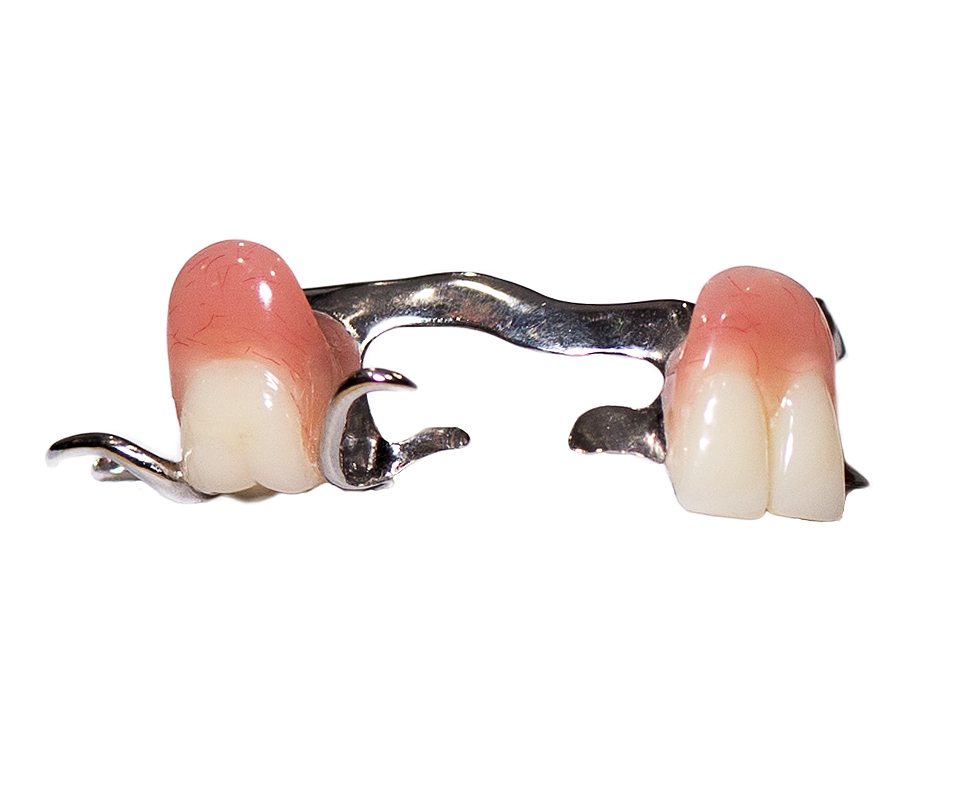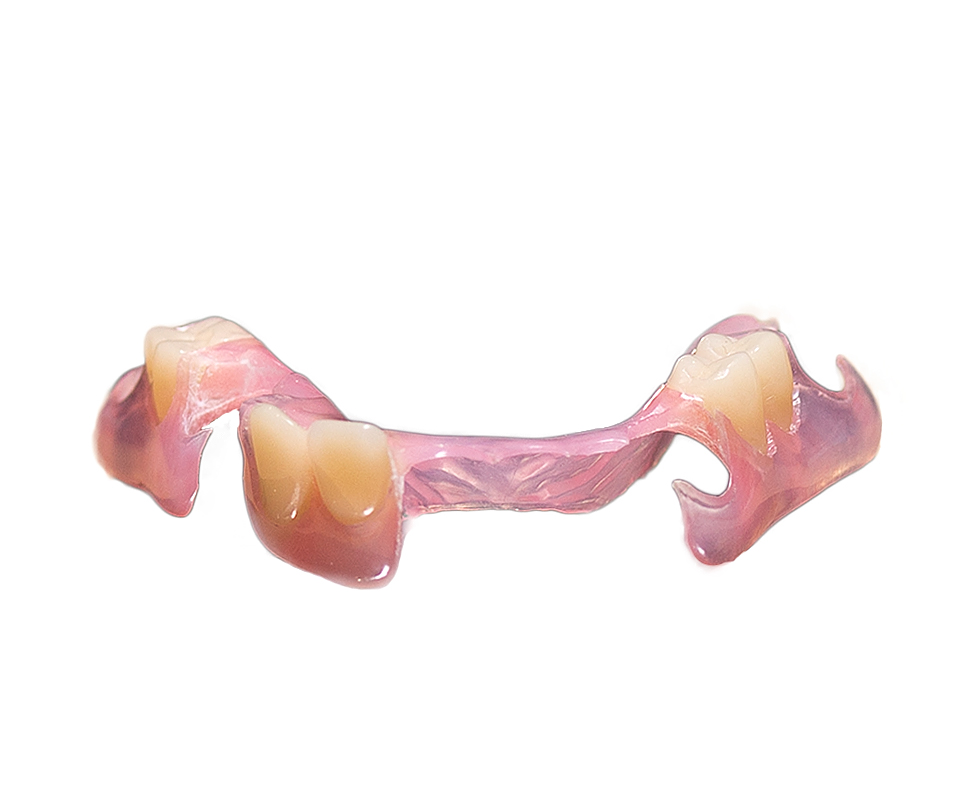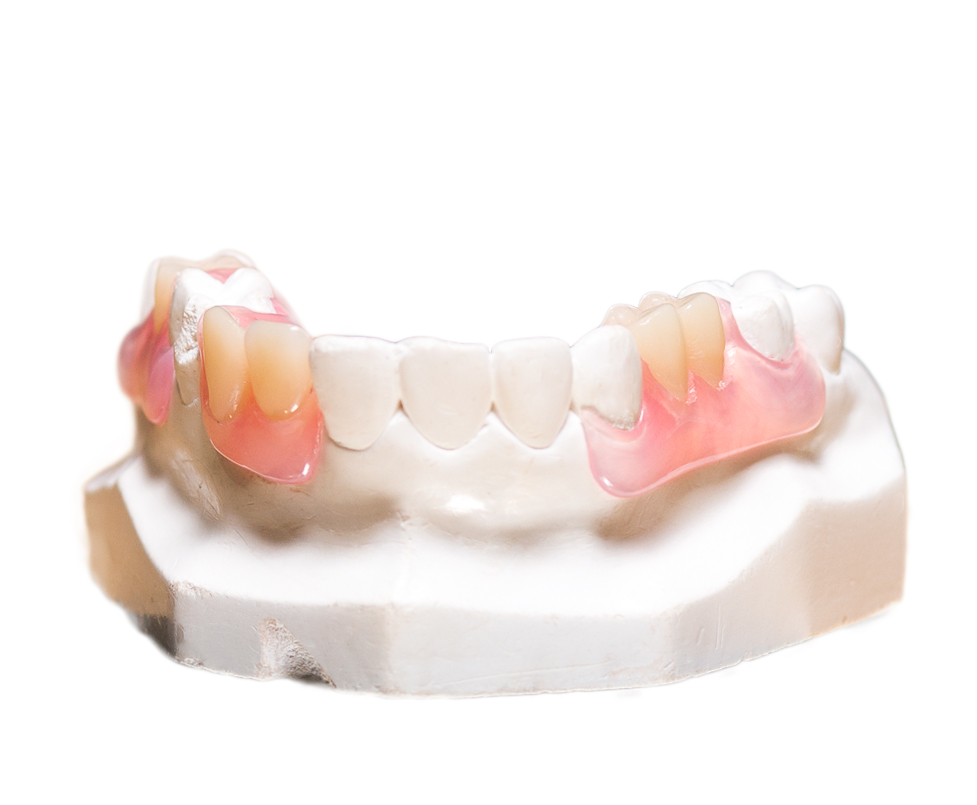
Dentures/Partial Dentures
Complete & Partial Dentures
Traditional complete dentures and partial dentures are excellent solutions for patients interested in quick, minimally invasive treatment. These prostheses can be a long-term option or a short-term option, such as teeth replacement during the interim (healing) phase of treatments involving dental implants. Dentures and partial dentures can also be made to fit onto dental implants in order to improve retention and stability of the prostheses.
- Implant-Supported Overdenture
- Complete Dentures
- Partial Dentures
- Interim Dentures
- Interim Partial Dentures
A denture can be made to “snap” onto implants, providing better retention and stability. This is an excellent solution for patients who are unhappy with the fit of their existing dentures.
HYGIENE INSTRUCTIONS
It is important that you clean your dentures several times a day with a denture brush with either a paste or powder. A denture brush can be purchased at any drug store, and you will note that the bristles are stiffer than a traditional tooth brush. There are many good commercial cleaning powders and pastes on the market today, and we recommend following the manufacturer’s directions.
To remove hardened calculus or tarter, soak your denture overnight in a solution of half vinegar and half water. Do not use scouring powders or harsh abrasives as these will scratch the surface of the dentures. Leaving your dentures out over night also allows your oral tissues a chance to rest. This is an ideal time to soak them in a denture cleanser. If your dentures become badly stained, you may wish to come back to the office for advice or assistance.
Dental implants are made from synthetic materials, therefore they are not affected by tooth decay. However, gum health is important for long-term implant success. Good oral health care and regular dental check-ups are important for maintaining your gum health after a dental implant.
Plaque and bacteria that form around an implant can cause inflammation and lead to peri-implant disease, such as peri-implant mucositis and peri-implantitis. Daily cleaning of all the surfaces above and below the gumline is critical to preventing peri-implant disease.
WHAT TO EXPECT
Initially you will feel uncomfortable with your new dentures, we recommend reading aloud to learn to talk and enunciate clearly. You will notice that certain movements of your lips, tongue, and cheeks may tend to displace the dentures. Some patients have chosen to avoid speaking in public until their muscles have accommodated to their new dentures. The lower denture is usually more difficult to learn to use than the upper.
During the adjustment and settling process you may develop soreness. It may appear the first day or much later. If the soreness persists, please contact our office to arrange an appointment. Your dentures can be more accurately adjusted if they have not been worn for the past 24-48 hours.
It is important to recognize that you will initially have a difficult time eating with your new dentures. It has been shown that dentures are only about 25% efficient as natural teeth. First you must become accustomed to having dentures in your mouth. Then begin with soft foods, those that are easy to chew. Gradually learn to eat other foods by taking small bites and chewing slowly. You will experience difficulties with each new food your introduce, but if you distribute the food evenly on both sides and chew on the back teeth this will make it easier to function.
HYGIENE INSTRUCTIONS
It is important that you clean your dentures several times a day with a denture brush with either a paste or powder. A denture brush can be purchased at any drug store, and you will note that the bristles are stiffer than a traditional tooth brush. There are many good commercial cleaning powders and pastes on the market today, and we recommend following the manufacturer’s directions.
To remove hardened calculus or tarter, soak your denture overnight in a solution of half vinegar and half water. Do not use scouring powders or harsh abrasives as these will scratch the surface of the dentures. Leaving your dentures out over night also allows your oral tissues a chance to rest. This is an ideal time to soak them in a denture cleanser. If your dentures become badly stained, you may wish to come back to the office for advice or assistance.
DENTURE RELINES
A reline is a procedure used to re-fit the surface of a denture to the tissues of the mouth. This is done by placing a new acrylic base into the denture, duplicating the new form of the oral structures in the mouth. A reline will bring back comfort, stability, and discourage food from going under the denture. In order to accurately reline your denture, please remove your denture 12 hours prior to your visit at the office. This will allow your tissues to relax prior to proceeding with a reline. Listed below are the three common types of relines.
A soft/hard chairside reline:This type of reline is often used on uncomfortable dentures to provide extra comfort, when the fit has changed, or when the dentures are difficult to wear. Occasionally soft temporary relining material is used inside a denture to provide a comfortable healing zone for dental implants below your denture, prior to their loading. This type of reline is a temporary fix and is not meant as a definitive procedure.
Rebasing the denture:Rebasing a denture (often called "jumping" the denture) is similar to a hard chairside reline, except the processing of the acrylic produces a harder, less porous material. A rebase is often done when the denture has multiple cracks or repairs and does not fit well, but the teeth themselves are still in good condition and fit correctly with the teeth in the opposite arch. This type of reline takes approximately 2 ½ hours of laboratory work; therefore, be prepared to be without your denture for the majority of your appointment. This is a definitive procedure.
A processed out-of-office reline: This type of reline is similar to the rebasing of a denture however the processing time is much greater and requires the services of an outside laboratory. This procedure is completed with the use of acrylic that is more durable, color stable, and less porous than the chairside reline.
Relines are required for many reasons with the most common reason being bone resorption. Bone resorption is caused by the normal process of aging or after natural teeth have been extracted. The average life expectancy of a denture is 5 - 7 years. Although the denture is likely to last considerably longer than this, the shape of your mouth will have changed and an older denture can harbor bacteria that may cause oral health problems.
A partial denture is a removable dental appliance that helps restore the form and function of your jaw by replacing one or several missing teeth. Partial dentures are made from a combination of metal and acrylic – which gives them the strength to handle your needs for chewing and speaking, while also looking natural.

An interim complete denture is used during the healing phase of your dental treatment. During this time, you will be able to chew and condition yourself to an artificial substitute for missing teeth until a more definitive prosthetic treatment can be provided. It is important to note that an interim complete denture will require several adjustments and relines. Relines are required for many reasons with the most common reason being bone resorption. Bone resorption is caused by the normal process of aging or after natural teeth have been extracted.
HYGIENE INSTRUCTIONS
It is important that you clean your dentures several times a day with a denture brush with either a paste or powder. A denture brush can be purchased at any drug store, and you will note that the bristles are stiffer than a traditional tooth brush. There are many good commercial cleaning powders and pastes on the market today, and we recommend following the manufacturer’s directions.
To remove hardened calculus or tarter, soak your denture overnight in a solution of half vinegar and half water. Do not use scouring powders or harsh abrasives as these will scratch the surface of the dentures. Leaving your dentures out overnight also allows your oral tissues a chance to rest. This is an ideal time to soak them in a denture cleanser. If your dentures become badly stained, you may wish to come back to the office for advice or assistance.
DENTURE RELINE
A reline is a procedure used to re-fit the surface of a denture to the tissues of the mouth. This is done by placing a new acrylic base into the denture, duplicating the new form of the oral structures in the mouth. A reline will bring back comfort, stability, and discourage food from going under the denture. In order to accurately reline your denture, please remove your denture 12 hours prior to your visit at the office. This will allow your tissues to relax prior to proceeding with a reline. Listed below is the most common reline preformed on an interim denture.
- A soft/hard chairside reline: This type of reline is often used on uncomfortable dentures to provide extra comfort, when the fit has changed, or when the dentures are difficult to wear. Occasionally soft temporary relining material is used inside a denture to provide a comfortable healing zone for dental implants below your denture, prior to their loading. This type of reline is a temporary fix and is not meant as a definitive procedure.



